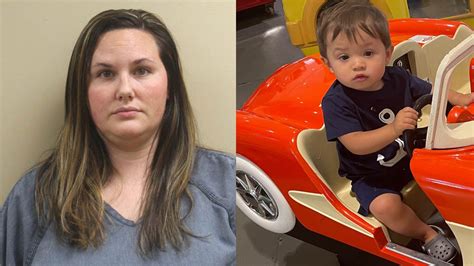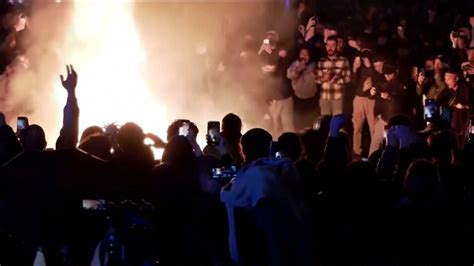
A daycare employee in Oklahoma City has been charged with first-degree manslaughter after an 18-month-old toddler died on her first day at the facility. Paris Jane Woodward, 23, is accused of placing the child face down in a crib for naptime, a position authorities say directly contributed to the infant’s death.
Paris Jane Woodward, 23, a daycare worker at Little Dreamers Daycare in Oklahoma City, faces a first-degree manslaughter charge following the death of an 18-month-old girl on what was supposed to be the child’s first day at the facility. According to court documents and police reports, Woodward placed the toddler face down in a crib for a nap on January 16, 2024, a deviation from safe sleep practices that investigators believe directly led to the infant’s demise.
The incident unfolded at Little Dreamers Daycare, located in the 6700 block of NW 122nd Street, where the young girl was starting her care. Around 1:40 p.m., Woodward put the child down for a nap, positioning her on her stomach. Approximately two hours later, at 3:40 p.m., she found the toddler unresponsive. Despite immediate attempts to revive the infant and the subsequent arrival of paramedics, the child was pronounced dead at the scene.
The Oklahoma City Police Department’s investigation revealed critical details that led to Woodward’s arrest. Detectives reviewed security footage and interviewed staff members, piecing together the events leading up to the tragic discovery. According to the arrest affidavit, Woodward admitted to placing the child face down in the crib. She stated she was aware of the daycare’s policy requiring infants to be placed on their backs to sleep, a guideline consistent with safe sleep recommendations from pediatricians and child safety organizations aimed at preventing Sudden Infant Death Syndrome (SIDS) and other sleep-related deaths.
Further investigation revealed that Woodward allegedly falsified the daycare’s sleep log to indicate that she had placed the child on her back, directly contradicting both her own admission and the evidence obtained from the daycare’s surveillance system. This alleged falsification of records added another layer of complexity to the case, suggesting an attempt to conceal the deviation from established safety protocols.
The Oklahoma Office of Child Care Enforcement has launched its own investigation into Little Dreamers Daycare to determine if any licensing violations occurred and to assess the overall safety practices at the facility. The daycare remains open, but under increased scrutiny. The agency’s investigation will likely focus on staffing ratios, employee training, adherence to safety regulations, and the daycare’s history of compliance.
The toddler’s family, understandably devastated, is seeking answers and justice. While they have chosen to remain largely private during this difficult time, their grief and pain are palpable. The community has rallied around the family, offering support and condolences as they navigate this unimaginable loss.
This case has sparked widespread concern and outrage among parents and child care advocates, highlighting the critical importance of safe sleep practices in daycare settings. It has also raised questions about the training, supervision, and accountability of daycare staff, as well as the effectiveness of regulatory oversight in ensuring the safety and well-being of children in care.
The arrest of Paris Jane Woodward is a significant step in the legal process, but it is only the beginning. The prosecution will need to present a compelling case to prove Woodward’s culpability in the child’s death. The defense, on the other hand, will likely argue that the death was not directly caused by Woodward’s actions or that other factors may have contributed to the tragedy. The case is expected to be complex and emotionally charged, with significant implications for both Woodward and the daycare facility.
Safe Sleep Practices and Recommendations
The American Academy of Pediatrics (AAP) has long advocated for safe sleep practices to reduce the risk of SIDS and other sleep-related infant deaths. These recommendations include:
- Always place infants on their backs to sleep, for naps and at night, until they reach one year of age. This position has been shown to significantly reduce the risk of SIDS.
- Use a firm sleep surface, such as a crib mattress covered by a fitted sheet. Avoid soft surfaces like couches, sofas, or pillows, which can increase the risk of suffocation.
- Keep the crib bare, with no loose bedding, pillows, blankets, or toys. These items can pose a suffocation hazard.
- Share a room with the infant, but not the same bed, for at least the first six months of life. Room-sharing allows for easier monitoring of the infant.
- Avoid overheating the infant. Dress the infant in light clothing and keep the room at a comfortable temperature.
- Consider using a pacifier at naptime and bedtime, once breastfeeding is well established. Pacifiers have been shown to reduce the risk of SIDS.
- Avoid the use of infant sleep positioners or other devices that claim to prevent SIDS. These devices have not been proven to be effective and may actually increase the risk of suffocation.
The importance of adhering to these guidelines cannot be overstated, particularly in daycare settings where multiple infants are under the care of a limited number of staff members. Daycare providers have a responsibility to ensure that all employees are thoroughly trained in safe sleep practices and that these practices are consistently followed.
Licensing and Regulation of Daycare Facilities
Daycare facilities are typically licensed and regulated by state agencies, such as the Oklahoma Office of Child Care Enforcement. These agencies are responsible for setting standards for safety, staffing, training, and other aspects of daycare operations. They also conduct inspections to ensure that daycare facilities are in compliance with these standards.
Licensing and regulatory requirements vary from state to state, but they generally include:
- Background checks for all employees: To ensure that individuals with a history of child abuse or neglect are not employed in daycare settings.
- Training requirements for staff: Including training in first aid, CPR, and safe sleep practices.
- Staffing ratios: To ensure that there are enough staff members to adequately supervise the children in care.
- Safety standards: Including requirements for fire safety, sanitation, and playground safety.
- Record-keeping requirements: Including records of immunizations, emergency contacts, and incident reports.
The effectiveness of daycare regulation depends on a number of factors, including the adequacy of the standards, the frequency and thoroughness of inspections, and the enforcement of penalties for violations. In some cases, regulatory agencies may be understaffed or underfunded, which can limit their ability to effectively oversee daycare facilities.
The Legal Implications of First-Degree Manslaughter
In Oklahoma, first-degree manslaughter is defined as the killing of a human being, without malice, in the commission of an unlawful act not amounting to a felony, or in the commission of a lawful act which might produce death, in an unlawful manner, or without due caution and circumspection.
To convict Paris Jane Woodward of first-degree manslaughter, the prosecution must prove beyond a reasonable doubt that:
- The victim died.
- Woodward caused the victim’s death.
- Woodward caused the death while committing an unlawful act not amounting to a felony, or while committing a lawful act which might produce death, in an unlawful manner, or without due caution and circumspection.
The prosecution will likely argue that Woodward’s act of placing the child face down in the crib constituted an unlawful act or a lawful act committed without due caution and circumspection, and that this act directly caused the child’s death. They may also argue that Woodward’s alleged falsification of the sleep log demonstrates a consciousness of guilt and an attempt to cover up her negligence.
The defense, on the other hand, may argue that the child’s death was not directly caused by Woodward’s actions or that other factors may have contributed to the tragedy. They may also argue that Woodward did not act with the requisite level of negligence to warrant a conviction for first-degree manslaughter.
If convicted of first-degree manslaughter, Woodward could face a sentence of no less than four years in prison.
Community Response and Support
The death of the 18-month-old girl has deeply impacted the Oklahoma City community. Local residents have expressed their grief and outrage, and many have offered support to the child’s family.
Various organizations and individuals have stepped forward to provide assistance, including:
- Grief counseling services: To help the family and others affected by the tragedy cope with their loss.
- Financial assistance: To help the family cover funeral expenses and other costs.
- Child care advocacy groups: To raise awareness about safe sleep practices and advocate for stronger regulations of daycare facilities.
- Online fundraising campaigns: To collect donations for the family.
The outpouring of support from the community demonstrates the collective sense of sorrow and the shared commitment to ensuring the safety and well-being of children.
Potential Civil Lawsuit
In addition to the criminal charges against Paris Jane Woodward, Little Dreamers Daycare may also face a civil lawsuit filed by the child’s family. A civil lawsuit would seek monetary damages for the family’s losses, including pain and suffering, medical expenses, and funeral costs.
To prevail in a civil lawsuit, the family would need to prove that the daycare was negligent in its care of the child and that this negligence caused the child’s death. Negligence can be established by showing that the daycare failed to exercise reasonable care in protecting the child from harm.
If the family is successful in a civil lawsuit, they could recover a substantial amount of money in damages. This money could help them cope with their loss and provide for their future needs.
Long-Term Implications for Daycare Industry
This tragic incident is likely to have long-term implications for the daycare industry. It has already sparked renewed calls for stronger regulations and increased oversight of daycare facilities. It may also lead to changes in daycare practices, such as:
- More comprehensive training for daycare staff: Including training in safe sleep practices, child development, and emergency procedures.
- Stricter enforcement of safe sleep policies: To ensure that infants are always placed on their backs to sleep.
- Increased monitoring of daycare facilities: To ensure that they are in compliance with safety regulations.
- Greater transparency and accountability: To make it easier for parents to assess the safety and quality of daycare facilities.
Ultimately, the goal is to create a safer and more nurturing environment for children in daycare settings, where parents can feel confident that their children are being well cared for.
The Importance of Parental Vigilance
While regulatory agencies and daycare providers have a responsibility to ensure the safety of children in care, parents also play a crucial role in protecting their children. Parents should:
- Carefully research daycare facilities: Before enrolling their children, parents should thoroughly research daycare facilities to ensure that they are licensed, accredited, and have a good reputation.
- Visit the daycare facility: Parents should visit the daycare facility to observe the environment, meet the staff, and ask questions about their policies and procedures.
- Communicate with daycare staff: Parents should communicate regularly with daycare staff to discuss their child’s needs and concerns.
- Be aware of safe sleep practices: Parents should be aware of safe sleep practices and ensure that the daycare facility is following these practices.
- Trust their instincts: If parents have any concerns about the safety or quality of care at a daycare facility, they should trust their instincts and take action to protect their children.
By working together, parents, regulatory agencies, and daycare providers can create a safer and more nurturing environment for children in care.
Frequently Asked Questions (FAQ)
1. What specific charge does Paris Jane Woodward face, and what does it entail?
Paris Jane Woodward faces a charge of first-degree manslaughter. In Oklahoma, this charge applies when a person causes the death of another human being without malice, either during the commission of an unlawful act not amounting to a felony, or while performing a lawful act that could cause death but is done unlawfully or without due caution and circumspection.
2. What are the key safe sleep recommendations from the American Academy of Pediatrics (AAP) that are relevant to this case?
The AAP recommends that infants should always be placed on their backs to sleep, on a firm sleep surface like a crib mattress with a fitted sheet, and with no loose bedding, pillows, or toys in the crib. Room-sharing without bed-sharing is advised for at least the first six months, and overheating the infant should be avoided.
3. What steps is the Oklahoma Office of Child Care Enforcement taking in response to this incident?
The Oklahoma Office of Child Care Enforcement has launched an investigation into Little Dreamers Daycare to determine if there were any licensing violations. This includes assessing staffing ratios, employee training, adherence to safety regulations, and the daycare’s compliance history. The daycare remains open but under increased scrutiny.
4. What evidence led to the arrest of Paris Jane Woodward, and what role did the daycare’s surveillance system play?
Woodward’s arrest was based on several key pieces of evidence, including her own admission to placing the child face down in the crib, despite being aware of the daycare’s policy to place infants on their backs. The daycare’s surveillance system also contradicted her alleged falsification of the sleep log, which indicated she had placed the child on her back.
5. What are the potential legal consequences for Little Dreamers Daycare, and what types of civil actions could the toddler’s family pursue?
Little Dreamers Daycare could face potential civil lawsuits from the child’s family, seeking damages for pain and suffering, medical expenses, and funeral costs. The family would need to prove negligence on the part of the daycare in its care of the child, leading to the child’s death. If successful, they could receive substantial compensation. Furthermore, the Oklahoma Office of Child Care Enforcement investigation could result in the revocation or suspension of the daycare’s license if violations are found.









